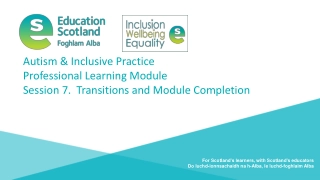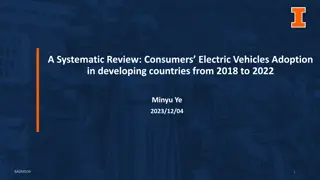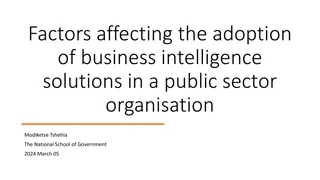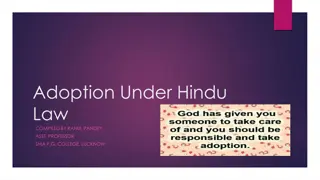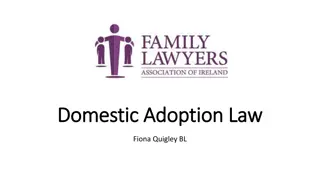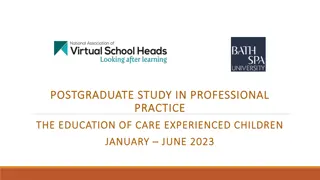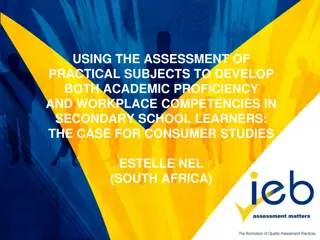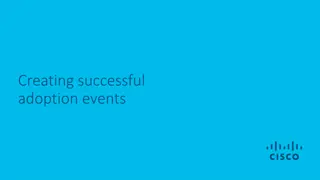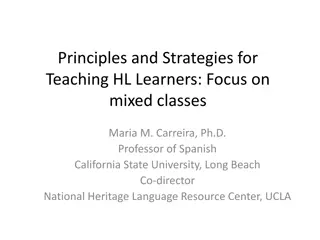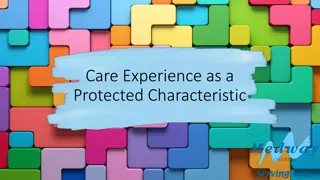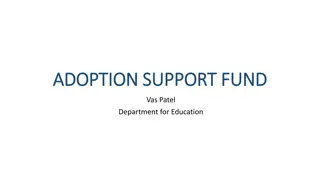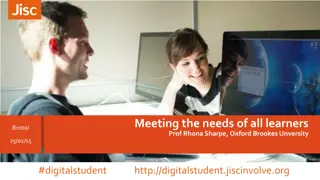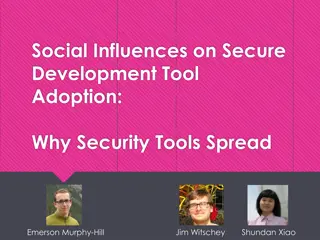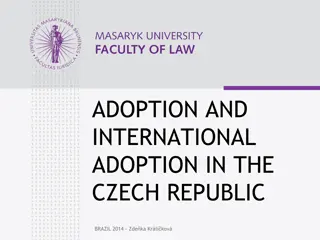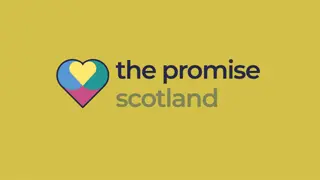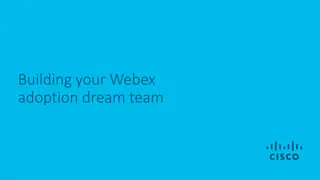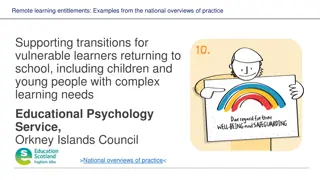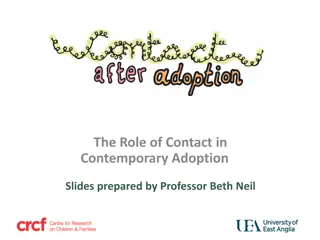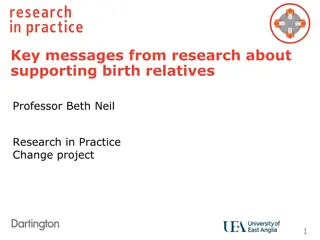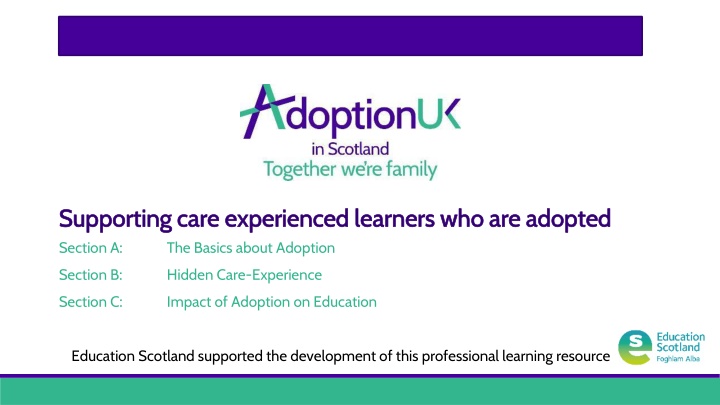
Adoption and Education for Care-Experienced Learners
Explore the basics of adoption, hidden care-experience, and the impact of adoption on education in this professional learning resource supported by Education Scotland. Learn about the challenges of adoption and what young people share about their experiences. Discover adoption statistics in education from the 2024 Adoption UK Barometer, highlighting the needs of care-experienced learners. Watch BBC Teach's clip on Molly's Story navigating school as an adopted child.
Download Presentation

Please find below an Image/Link to download the presentation.
The content on the website is provided AS IS for your information and personal use only. It may not be sold, licensed, or shared on other websites without obtaining consent from the author. If you encounter any issues during the download, it is possible that the publisher has removed the file from their server.
You are allowed to download the files provided on this website for personal or commercial use, subject to the condition that they are used lawfully. All files are the property of their respective owners.
The content on the website is provided AS IS for your information and personal use only. It may not be sold, licensed, or shared on other websites without obtaining consent from the author.
E N D
Presentation Transcript
Supporting care experienced learners who are adopted Supporting care experienced learners who are adopted Supporting care experienced learners who are adopted Supporting care experienced learners who are adopted Section A: The Basics about Adoption Section B: Hidden Care-Experience Section C: Impact of Adoption on Education Education Scotland supported the development of this professional learning resource
Section A Section A The Basics about Adoption
The Basics about Adoption The Basics about Adoption Once a child has been adopted, and the court has issued an adoption order , the adoptive parent becomes the legal guardian. All parental rights transfer to the adoptive parent. Most children who are adopted have been removed from the family home due to risks to their safety. When a child starts school, their adoptive parents may choose not to share the child s adoptive status. Some children continue to have contact with birth families, through letters or face-to-face meetings, and others have no contact. Adopted children are more often recorded as requiring additional support compared to their peers. Adoption is lifelong.
The challenges of adoption The challenges of adoption A child who is adopted will have experienced multiple, and repeated losses. A child who is adopted will have multiple families (birth, foster, adoptive) which can lead to confusion. A child who is adopted is previously care-experienced , but this may not be recorded on SEEMIS. The misinformation and stigma of adoption is harmful: adoptees are not lucky and should not be grateful . Pre-birth trauma is lifelong: the adoptee can be affected by in-utero experiences caused by substance abuse, neglect and violence. The percentage of children with prenatal alcohol exposure is four times more likely in children who are adopted. Procedures for diagnosing FASD are not yet embedded across all local authority health boards.
What do young people tell us about adoption? What do young people tell us about adoption? Watch the BBC Teach Clip Supporting care-experienced children: Molly's Story - navigating school when you are adopted https://www.bbc.co.uk/teach/teacher-support (Molly's Story) A hand pointing at a red button to symbolise 'Play me'. Click this link to access the BBC Teach Clip on 'Supporting care-experienced children: Molly's story - navigating school when you are adopted.
Adoption Statistics in Education Adoption Statistics in Education The 2024 Adoption UK Barometer provides a stock take of policy and practice: of respondents in Scotland felt their child s school had a good understanding of the needs of care-experienced learners 49% 49% of respondents in Scotland felt their child required more support compared to other children of the same age 53% 53% of respondents said it is a continual struggle to get the help and support their children need 90% 90% 13% 13% of respondents felt wider services understood their child s needs
Adoption Statistics in Education Data Adoption Statistics in Education Data At present there is no national record of how adopted children fare in school regarding: Attendance Wellbeing Attainment Positive Destination Adopted learners should be recorded under the Previously Looked After tab on SEEMIS. However, adoptees' data cannot be disaggregated from all other types of previous care experience.
What do young people tell us about school? What do young people tell us about school? 5 min 11 sec Film co- created by Adoption UK For more Adoption UK (Scotland) resources see Adoption UK (Scotland) Adoption UK (Scotland) Link to access film: https://youtu.be/r8T9AgMccn8 https://youtu.be/r8T9AgMccn8
Reflection Activity 1: Discuss Reflection Activity 1: Discuss Why do you think so many learners, and their families, report challenges with education? Reflecting on your own practice: what lesson content, routines, or practice, can you identify that might be dysregulating for some learners? what adjustments could you make learner feel safe and regulated when they are with you?
Section B Section B Hidden Care-Experience
Child Perspective Child Perspective The adoptee: may have gaps in knowledge about their personal history may internalise thoughts about identity and personal history may create fantasies to fill gaps in knowledge does not see themselves or family represented positively in literature or media may worry about being bullied or stigmatised for their adoption does not want to be seen or treated differently may not realise that their thoughts and reactions are a natural response to what has happened to them Why might a learner find it difficult to focus during a class discussion on evacuees being sent away from home?
Parent Perspective Parent Perspective The adoptive parent: is rarely given opportunities to declare adoptive status in forms or surveys does not want to share sensitive information about their child or themselves to strangers does not want to be treated differently to other families may be worried about their child being bullied or being stigmatised for their adoption may not realise that the challenges they face at home or school are different to other families How do we create safe and natural opportunities for families to communicate with us?
School Perspective School Perspective Schools: may not know a child is adopted may not make the connection between adoption and previous care-experience may link behaviour to trauma or care-experience rather than neurodivergent needs may underestimate the complexity of needs may perceive the learner to be fine because they are adopted and no longer looked after may use approaches that can increase a learner s dysregulation What information would you find useful to plan support for adopted learners?
Considering Pre-Natal Alcohol Exposure and Fetal Alcohol Spectrum Within the general population, the prevalence of FASD is around 3-5% (1 in 20 people). But, within the care-experienced population, particularly children and young people who are adopted, up to 75% are at risk of FASD due to prenatal alcohol exposure (3 in 4 people)* There are ten brain functions which can potentially be affected by alcohol during pregnancy: executive functioning sensory and motor academic skills focus and attention cognition (reasoning and thinking) communication brain structure living and social skills memory FASD is a hidden disability. You cannot tell by looking at someone whether they have the condition. affect regulation Understanding FASD What Educators Need to Know * Research in Peterborough (Gregory et.al 2015)
FASD Makes Me, Me FASD Makes Me, Me 4 min 55 Sec Film co- created by Adoption UK and children, young people and adults with FASD. For more information visit FASD Hub FASD Hub Link to access film: https://youtu.be/VammKhercZ8 https://youtu.be/VammKhercZ8
Reflection Activity 2 Reflection Activity 2 What environmental and relationship adjustments does your school make to help learners and their families feel safe and included? What extra adjustments might you have to make to ensure adoptive families feel a sense of belonging?
Section C Section C Impact of Adoption on Education
Mental Health of Children and Young People who are Adopted Mental Health of Children and Young People who are Adopted
Impact of Adoption on Wellbeing Impact of Adoption on Wellbeing Due to a range of reasons, adopted learners' wellbeing may be compromised. Children and young people who feel well are more likely to engage in learning and fully access education. Wellbeing can be assessed using the Getting it Right for Every Child (GIRFEC) Wellbeing Indicators. Wellbeing and learning support should be readily available for all learners.
Impact of Adoption on Education Impact of Adoption on Education In their education, learners who are adopted may: be distracted (for example, lost in thoughts, checking where people are and if they are safe) be quiet or withdrawn be compliant or overly keen to please be loud or extrovert be overwhelmed processing sensory information from people, noises, learning, expectations, heat, etc have difficulty managing complex social exchanges (may feel left out, argue, fight, be isolated) have difficulty working at home due to compartmentalising home and school be competitive (for example, desire to win, be picked or come first) not progress onto a positive destination such as further education, training or work due to undiagnosed needs related to care-experience, neurodiversity or adoption
A learners perspective A learner s perspective Ava s Story Ava s Story 2 min 19 sec Film co- created by Adoption UK For more Adoption UK (Scotland) resources see Adoption UK (Scotland) Adoption UK (Scotland) Link to access film: https://www.youtube.com/watch?v=852S1mlqV2s https://www.youtube.com/watch?v=852S1mlqV2s
Reflection Activity 3 Reflection Activity 3 How do you ensure early intervention of support for an adopted young person and their family?
Next steps for our educational setting? Next steps for our educational setting?
Further resources Further resources Raise awareness of adoption among school practitioners Raise awareness of adoption among school practitioners BBC: Supporting care-experienced children - BBC Teach Adoption UK Barometer Strategies to support adopted children in school Strategies to support adopted children in school Checklist for Teachers Trauma Proofing the Curriculum Talking about Adoption Secure and Successful S Supporting organisations with resources upporting organisations with resources Adoption UK Enquire: Care experienced learners rights Kinship Care and Advice Service Scotland Scottish Adoptee Adult Movement Facebook Group St Andrew s Children Society Scottish Adoption
Your feedback Your feedback could help us improve this resource and add to the overall value of the professional learning framework to the educational system Please complete this short form, using the link or QR code, to let us know what you thought of it and any suggestions you have on how it could be improved 2025 LINK: https://forms.office.com/e/J2NQUuCHji For Scotland's learners, with Scotland's educators Do luchd-ionnsachaidh na h-Alba, le luchd-foghlaim Alba

